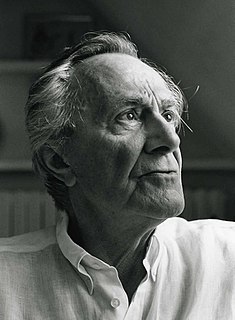A Quote by Theodor W. Adorno
An emancipated society, on the other hand, would not be a unitary state, but the realization of universality in the reconciliation of differences.
Quote Topics
Related Quotes
I find it hard to understand why those who demand Unitary Education by the State do not also demand a Unitary Press by the State... Either the State is infallible, in which case we could not do better than to submit to it the entire domain of intelligent thought, or it is not, in which case it is no more rational to hand over education to it than the press.
Our vulnerability [to ressentiment] is unavoidable (and probably incurable) in a kind of society in which relative equality of political and other rights and formally acknowledged social equality go hand in hand with enormous differences in genuine power, possessions and education; a society in which everyone "has the right" to consider himself equal to everybody else, while in fact being unequal to them.
[T]here are, at bottom, basically two ways to order social affairs, Coercively, through the mechanisms of the state - what we can call political society. And voluntarily, through the private interaction of individuals and associations - what we can call civil society. ... In a civil society, you make the decision. In a political society, someone else does. ... Civil society is based on reason, eloquence, and persuasion, which is to say voluntarism. Political society, on the other hand, is based on force.
The nineteenth and twentieth centuries have given us as much terror as we can take. We have paid a high enough price for the nostalgia of the whole and the one, for the reconciliation of the concept and the sensible, of the transparent and the communicable experience. Under the general demand for slackening and for appeasement, we can hear the mutterings of the desire for a return of terror, for the realization of the fantasy to seize reality. The answer is: Let us wage a war on totality; let us be witnesses to the unpresentable; let us activate the differences.
It is a travesty, in my mind, for the state and local governments on the one hand to expect the Federal government to reimburse them for costs attributable to illegal immigrants, when on the other hand the State and local governments prohibit their own law enforcement and other officials from cooperating with the Immigration and Naturalization Service to locate or apprehend or expel illegal aliens.
The differences between religions are only differences involving the pathways that lead toward the practice of directly experiencing higher levels of perception and understanding. All religions are paths to a metaphorical mountain-top variously named Wisdom, enlightenment, self-realization, the kingdom of heaven, righteousness, etc. Differences that lead to violence and persecution are based on a corrupted relationship to the teachings and practices of religion.
If a poet has any obligation toward society, it is to write well. Being in the minority, he has no other choice. Failing this duty, he sinks into oblivion. Society, on the other hand, has no obligation toward the poet. A majority by definition, society thinks of itself as having other options than reading verses, no matter how well written. Its failure to do so results in its sinking to that level of locution at which society falls easy prey to a demagogue or a tyrant. This is society's own equivalent of oblivion.
People come to have different moral beliefs because they have different non-moral beliefs about relevant facts. People are disposed to believe whatever justifies the practices and institutions that benefit them. But I argue that not all moral differences can be explained away in such a fashion. Some of the most profound disagreements come from differences in priority assigned to values such as relationship and community on the one hand, and individual rights and personal autonomy for the individual, on the other hand.









































